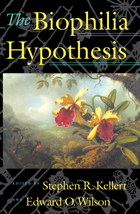
"Biophilia" is the term coined by Edward O. Wilson to describe what he believes is humanity's innate affinity for the natural world. In his landmark book Biophilia, he examined how our tendency to focus on life and lifelike processes might be a biologically based need, integral to our development as individuals and as a species. That idea has caught the imagination of diverse thinkers.
The Biophilia Hypothesis brings together the views of some of the most creative scientists of our time, each attempting to amplify and refine the concept of biophilia. The variety of perspectives -- psychological, biological, cultural, symbolic, and aesthetic -- frame the theoretical issues by presenting empirical evidence that supports or refutes the hypothesis. Numerous examples illustrate the idea that biophilia and its converse, biophobia, have a genetic component:
- fear, and even full-blown phobias of snakes and spiders are quick to develop with very little negative reinforcement, while more threatening modern artifacts -- knives, guns, automobiles -- rarely elicit such a response
- people find trees that are climbable and have a broad, umbrella-like canopy more attractive than trees without these characteristics
- people would rather look at water, green vegetation, or flowers than built structures of glass and concrete
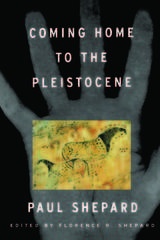
"When we grasp fully that the best expressions of our humanity were not invented by civilization but by cultures that preceded it, that the natural world is not only a set of constraints but of contexts within which we can more fully realize our dreams, we will be on the way to a long overdue reconciliation between opposites which are of our own making." --from Coming Home to the Pleistocene
Paul Shepard was one of the most profound and original thinkers of our time. Seminal works like The Tender Carnivore and the Sacred Game, Thinking Animals, and Nature and Madness introduced readers to new and provocative ideas about humanity and its relationship to the natural world. Throughout his long and distinguished career, Paul Shepard returned repeatedly to his guiding theme, the central tenet of his thought: that our essential human nature is a product of our genetic heritage, formed through thousands of years of evolution during the Pleistocene epoch, and that the current subversion of that Pleistocene heritage lies at the heart of today's ecological and social ills.
Coming Home to the Pleistocene provides the fullest explanation of that theme. Completed just before his death in the summer of 1996, it represents the culmination of Paul Shepard's life work and constitutes the clearest, most accessible expression of his ideas. Coming Home to the Pleistocene pulls together the threads of his vision, considers new research and thinking that expands his own ideas, and integrates material within a new matrix of scientific thought that both enriches his original insights and allows them to be considered in a broader context of current intellectual controversies. In addition, the book explicitly addresses the fundamental question raised by Paul Shepard's work: What can we do to recreate a life more in tune with our genetic roots? In this book, Paul Shepard presents concrete suggestions for fostering the kinds of ecological settings and cultural practices that are optimal for human health and well-being.
Coming Home to the Pleistocene is a valuable book for those familiar with the life and work of Paul Shepard, as well as for new readers seeking an accessible introduction to and overview of his thought.

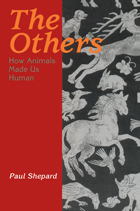
Paul Shepard has been one of the most brilliant and original thinkers in the field of human evolution and ecology for more than forty years. His thought-provoking ideas on the role of animals in human thought, dreams, personal identity, and other psychological and religious contexts have been presented in a series of seminal writings, including Thinking Animals, The Tender Carnivore and the Sacred Game, and now The Others, his most eloquent book to date.
The Others is a fascinating and wide-ranging examination of how diverse cultures have thought about, reacted to, and interacted with animals. Shepard argues that humans evolved watching other animal species, participating in their world, suffering them as parasites, wearing their feathers and skins, and making tools of their bones and antlers. For millennia, we have communicated their significance by dancing, sculpting, performing, imaging, narrating, and thinking them. The human species cannot be fully itself without these others.
Shepard considers animals as others in a world where otherness of all kinds is in danger, and in which otherness is essential to the discovery of the true self. We must understand what to make of our encounters with animals, because as we prosper they vanish, and ultimately our prosperity may amount to nothing without them.
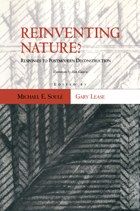
How much of science is culturally constructed? How much depends on language and metaphor? How do our ideas about nature connect with reality? Can nature be "reinvented" through theme parks and malls, or through restoration?
Reinventing Nature? is an interdisciplinary investigation of how perceptions and conceptions of nature affect both the individual experience and society's management of nature. Leading thinkers from a variety of fields -- philosophy, psychology, sociology, public policy, forestry, and others -- address the conflict between perception and reality of nature, each from a different perspective. The editors of the volume provide an insightful introductory chapter that places the book in the context of contemporary debates and a concluding chapter that brings together themes and draws conclusions from the dialogue.
In addition to the editors, contributors include Albert Borgmann, David Graber, N. Katherine Hayles, Stephen R. Kellert, Gary P. Nabhan, Paul Shepard, and Donald Worster.
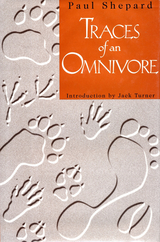
Paul Shepard is one of the most profound and original thinkers of our time. He has helped define the field of human ecology, and has played a vital role in the development of what have come to be known as environmental philosophy, ecophilosophy, and deep ecology -- new ways of thinking about human-environment interactions that ultimately hold great promise for healing the bonds between humans and the natural world. Traces of an Omnivore presents a readable and accessible introduction to this seminal thinker and writer.
Throughout his long and distinguished career, Paul Shepard has addressed the most fundamental question of life: Who are we? An oft-repeated theme of his writing is what he sees as the central fact of our existence: that our genetic heritage, formed by three million years of hunting and gathering remains essentially unchanged. Shepard argues that this, "our wild Pleistocene genome," influences everything from human neurology and ontogeny to our pathologies, social structure, myths, and cosmology.
While Shepard's writings travel widely across the intellectual landscape, exploring topics as diverse as aesthetics, the bear, hunting, perception, agriculture, human ontogeny, history, animal rights, domestication, post-modern deconstruction, tourism, vegetarianism, the iconography of animals, the Hudson River school of painters, human ecology, theoretical psychology, and metaphysics, the fundamental importance of our genetic makeup is the predominant theme of this collection.
As Jack Turner states in an eloquent and enlightening introduction, the essays gathered here "address controversy with an intellectual courage uncommon in an age that exults the relativist, the skeptic, and the cynic. Perused with care they will reward the reader with a deepened appreciation of what we so casually denigrate as primitive life -- the only life we have in the only world we will ever know."
READERS
Browse our collection.
PUBLISHERS
See BiblioVault's publisher services.
STUDENT SERVICES
Files for college accessibility offices.
UChicago Accessibility Resources
home | accessibility | search | about | contact us
BiblioVault ® 2001 - 2024
The University of Chicago Press









